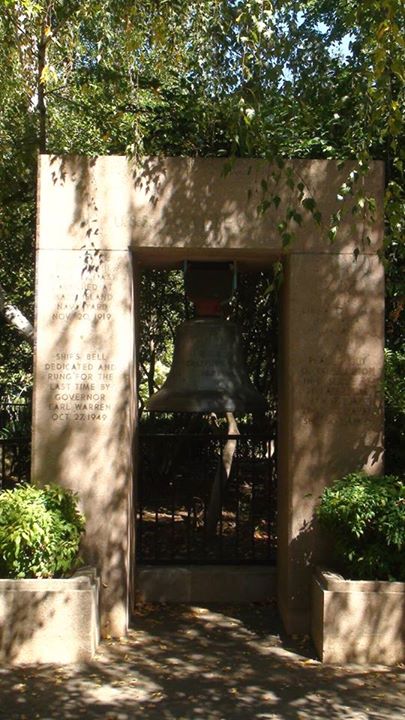
Saturday, 27 July 2013
For whom He foreknew, He also predestined to be conformed to the image of His Son, that He might be the firstborn among many brethren. Romans 8:29
The concept of “predestination” is so complicated and so debated over, that to analyze it even in a minor way takes a book worth of information. Paul begins again today with “For.” He is saying this as a result of his statement in 8:28 about all things being worked out for good for those who are the called according to His purpose.
Based on this, he says that those whom God “foreknew, He also predestined to be conformed to the image of His Son.” Those who are a part of God’s plans and purposes will be conformed. It is already done in God’s mind. Today’s verse, along with the logical progression that Paul will make in the coming verses shows us that this is so. How did this come about? There are a vast array of views on this and many sub-views as well. We will explore four main categories based on a rational comparison of “when” and “how” things work in the mind of God.
Please note that this is an extremely limited analysis of the issue, and it doesn’t cover all the bases, but is merely intended to demonstrate which major approach is correct and why. The four views to be looked at are supralapsarianism, infralapsarianism, sublapsarianism, and Wesleyanism. Although these concepts are very complicated, a simple example of ducks in a river will be used to help you along so that you don’t quack your head thinking too hard…
The wrong ones will be explained first, who believes them, and why. The first is Supralapsarianism (supra – above). It says that election, or predestination, is logically prior to the decree to permit the fall of man. In other words, even before sin entered the picture, election was made for all people.
This view involves a group known as hyper-Calvinists and it is also known as double-predestination. It is held by only a small, radical, and biblically unsound group of people. This view inevitably leads to judgmental egoists who feel God loves them and hates everyone else.
Because God predestined humanity before He permitted the fall of man, He therefore elected some for salvation and elected others for condemnation. He created them saved or condemned. That is their state and they have no choice in the matter. This means that God provides and applies salvation only for the elect; limited atonement.
To explain, we’ll use ducks in a river. God creates a pond and the ducks. He puts the ducks in the pond, but after the ducks enter the pond, there is a cataclysm and water starts draining from the pond into a river heading toward a waterfall. When the ones He created for salvation come along, He pulls them out of the water – whether they want it or not.
And the ones He created for condemnation… He actually pushes them down the river and into the waterfall before they can get out. This is a mean and angry God. But this is what some people believe. Double predestination means that God actually hates the non-elect, even though He created them.
With this doctrine, there is absolutely no reason to evangelize anyone. Why bother telling anyone about Jesus or sending out missionaries? God chose and that’s that. It is as close to ascribing evil to God as one can come because it, in fact, does.
The second incorrect view is Infralapsarianism (infra – below). This concept says that the decree of election is logically after the decree to permit the fall. This is held by strong Calvinists, but it is not double-predestination.
God created all and then permitted the fall. Since then, He has and will continue to elect some and will pass by others. He provides and applies salvation only for the elect (limited atonement). He chooses who will be saved and they have no choice in the matter.
RC Sproul, if you know who he is, would be in this category. This view still holds to limited atonement like the first view. In both views, God loves only the elect in terms of salvation. A problem with this is that, God is love – He loves everyone equally. There is no increase or decrease in His love for us from His perspective.
Let’s go back to the ducks to understand. God creates a quiet pond and the ducks. He puts the ducks in the pond, but after the ducks enter the pond, there is a cataclysm and water starts draining from the pond into a river heading toward a waterfall. When the ones He decides should be saved pass by, He pulls them out of the water – whether they want it or not.
The others simply head down the river and are destroyed in the waterfall. At least He doesn’t push them down the river, but He also doesn’t bother helping any of them out. They were simply not a part of his plan. This isn’t a hateful God, but He is rather uncaring about those He didn’t elect. Poor ducks…
Like the first view, there’s no reason why someone would bother telling about Jesus or sending out missionaries. They will dispute this, but it is the logical result of such a view. If God chooses us for salvation apart from our will then honestly, what is the point? Are God’s plans going to be thwarted by us somehow?
Also, proponents of this view would say that if it was intended for all to be saved, then all would be saved – because God’s sovereign intentions must come about. Therefore, if it wasn’t intended for all to be saved, then it was only intended for some, the elect.
But this is a false dilemma. The atonement of Jesus is an offering and it is intended to save all, but it only applies salvation for those who believe. Calvinism, wrongly assumes that the atonement of Jesus has only one purpose which is to secure the elect’s salvation – Jesus died so we can be saved.
In fact, Jesus’ sacrifice according to Roman’s 1 has another purpose – to reveal the righteousness of God in judgment. God sends His Son to die in your place and you turn Him down. Even without the cross we are condemned. How much more just is God in judgment because of it!
The result of the idea of limited atonement is that it denies that God really desires all people to be saved. This is contrary to His omni-benevolence and also to the Bible itself that “none should perish but that all should come to repentance” (2 Peter 3:9).
So you understand this view more clearly you need to consider the concept of free-will. Do we freely choose Christ, or does God choose us apart from our will. The two options are known as monergism and synergism.
Monergism teaches that regeneration is completely the result of God’s work and man has no part or cooperation in it. It is salvation by irresistible grace leading to regeneration and then to faith. In other words, a person is saved before they are saved. It is convoluted and it involves unclear thinking and a twisting of the Bible.
Also, this view actually usurps God. If you have no choice in your salvation, then how do you know you’re are saved? How can anyone make a claim that they’re saved when they didn’t have anything to do with their salvation? In other words, you are speaking for God by claiming salvation at all.
Of course, their answer is, “I believed after regeneration; therefore, I am saved.” However, there are false gospels and people believe them. There are people who believe wrongly and yet claim they are saved. When they find out they’re wrong, they change their belief (hopefully) in order to be saved. So when were they saved? When they believed correctly!
False gospels imply there is a true gospel and the spirit of the antichrist implies there is a true Spirit. Belief must precede regeneration. And it does. This is what the Bible teaches. Your faith brings salvation. Finally, monergism denies free will, but free will is necessary for love because forced love isn’t love at all.
Synergism teaches that we freely choose Christ and then are regenerated to life. This is exactly what the Bible teaches numerous times, both by Jesus’ words (e.g. John 3:16) as well as the apostolic writings (e.g. Ephesians 1:13, 14). An argument against this though is that the Bible says we are dead in our sins and that it is Jesus who restores us to life. The argument is, “How can a dead person choose life?”
RC Sproul says it this way – “You have as much power to awaken yourself from spiritual death as a corpse has the power to awaken himself from physical death.”
This is a category mistake. We are spiritually dead in our sins. We are not dead beings. God made us with the ability to reason, to choose, and to decline. In fact, this is exactly what Genesis 3:22 implies. Mixing these categories leads to bad theology, such as monergism. To understand this, one can watch my sermon on free will in Genesis 2 – http://www.youtube.com/watch?v=y1g8ykc6lCI.
The Bible teaches what we would call anthropological hylomorphism – we are a soul/body unity. The spirit of man is dead, but the spirit of man is tied to the soul. Paul, speaking to saved believers in 2 Corinthians 5, says the soul without a body is naked. The spirit of man is made alive when we call on Christ, even if the body later dies.
This is eternal life and it occurs the moment we believe. We don’t become a soul/body/spirit unity. Rather it is our soul which is now spiritually alive. Adam’s spirit died at the fall, faith in Christ regenerates that spirit. As I said, the spirit of antichrist which John speaks of confirms this.
The third wrong concept of our four major categories is Wesleyanism – named after John Wesley. This view says that God’s election is based on His foreknowledge but not necessarily in accord with it. In other words, God’s decrees are conditional – He changes mind.
This is the beginning of major error and it goes back to a guy named Jacob Arminius who lived in the 1500s. His view denies eternal security. It reveals a God who is changing and makes mistakes.
John Wesley couldn’t decide what was right and so he followed the teaching of Arminius after asking God for a sign and then throwing lots twice. But we don’t get our theology from happenstance and chance. Instead we get it from the Bible.
John Wesley, the Methodists, the Church of God, Mennonites, and others who hold this view are wrong. Like the previous view, they believe that God created all and then permitted the fall. Then He provides salvation for all people.
God knows who the elect are based on the foreseen faith of those who believe. Because of this faith, He applies salvation only to believers, but believers can lose their salvation.
For a duck example, God creates the pond, the river, and the ducks. He puts all the ducks in the pond and they eventually go to the river which is heading toward a waterfall. As the ducks come by, He leaves His favorite perfect duck on the shore quacking for the ducks to come out…
“There’s a waterfall ahead. If you don’t come out, you’ll get quacked up.” Some of the ducks come out and some decide they like the river. Those that come out, however, can never know if they have upset the perfect duck and have to go back in the river.
There is never true safety and in fact, these ducks can’t really tell the river from the shore. The poor ducks spend their entire life trying to please a group of lower ducks that the perfect duck left behind.
If the lower duck (a pastor), says they have been bad ducks, then off they go to the river again. Imagine being one of these poor, unsure, and ever-worried groups of ducks. Poor ducks…
Our final view is what is correct. First, it makes sense from a philosophic standpoint. Second, it makes sense from a moral standpoint. And third, it is the only view which is supported by the Bible. And it answers the question of why we fell in the first place.
It also answers where evil came from without ever ascribing it to God. Without this view, one is forever searching for where evil came from. This is a question Dr. Sproul and others must, and do, ask. They can never find an answer to it because their theology leaves no room for it.
Their mistaken idea is that God created everything perfect and so if man fell, then God must have blown it by creating a being that could fall. This is particularly true because if intent to sin is evil (as Jesus clearly says), then Adam fell before the fall because he lusted after the fruit before he ate it. But they know God didn’t create evil, so “Whence comes evil?”
The correct view is sublapsarianism (sub – under or after). God’s order to provide salvation came before His order to elect the people of the world (Rev 13:8) – “I will send my Son to die, and then that all who call on Him will be saved.” It provides unlimited atonement for everyone potentially, but only for God’s people who choose Christ actually.
Like the previous two views, this view holds that God created all and then permitted the fall of man. He provides salvation for all people, but the elect of God are those who believe. God passes by those who do not believe based on their rejecting His offer of Jesus. It isn’t that He doesn’t care about them, it is that they don’t care about Him.
This view applies salvation only to believers who cannot lose it. Yes, there is security, eternal security, in the arms of Christ. A theological basis for this view is that God is omni-benevolent. In other words, He loves all of the people of the world.
Yes Jesus loves me, this I know, for the Bible tells me so.
There is no hatred of the person and no active passing by people. He offers to all and the elect respond. He desires all to repent and come to Him for His unmerited salvation and favor. This doesn’t mean there is good in us, it means we see the good in Him and we come to it.
As far as our ducks are concerned, God creates the pond, the river, and the ducks. He puts all the ducks in the pond and they eventually end in the river which is heading toward a waterfall. As the ducks come by, He leaves His favorite perfect duck on the shore quacking for the ducks to come out and offering bread which will sustain them and guide them…
“There’s a waterfall ahead. If you don’t come out, you’ll get quacked up.” Some of the ducks come out and some decide they like the river. Those that do come out are protected by this perfect duck. If they stray, it is not to the river.
There is a force field that will never allow them to go toward that terrible place again. These imperfect ducks are saved from it despite themselves. God was pleased that they believed and though they may have forgotten it (2 Peter 1:9), He never did. They are eternally secure in the fold of His perfect duck, and this is despite crummy pastor ducks who come behind him.
The first two views hold to salvation only for the elect. The third view holds to salvation for believers but that they can lose it. The correct view holds to salvation for believers even though it is offered to all – and that when accepted it is a done deal, the salvation cannot be lost.
There is ample biblical support for both eternal salvation and salvation offered to all. Any verses which appear to contradict these views (such as John 6:44) are taken out of context by the theologically confused Christian.
So, having stated these things, Paul tells us in our subject verse that the predestination is for the reason “that He might be the firstborn among many brethren.” Jesus was the first of the resurrection. All who call on him are considered His “brethren.” We are adopted into God’s family and saved, eternally saved, despite ourselves.
Life application: To understand the workings of God as they apply to humans, one must properly understand the nature of God and also the nature of man. Should we err on either of these, then our thoughts about what God is doing, how He is doing it, and why He is doing it become skewed. When reading the Bible, we must accept the Bible as authoritative and then determine to discover the issues which lead to what the Bible proclaims. When we do this, we will be sound in our theology and free from the bondage of both legalism and scare tactics in relation to our state before God.
Lord Jesus, the Bible says that you are the Lamb slain from the foundation of the world. Before the pillars of creation were set in place, Your cross was already planned to save a sinner such as me. How could such love exist? How could I refuse such an offer? Glory to God in the highest and surely – “Worthy is the Lamb who was slain.” Hallelujah and Amen!




